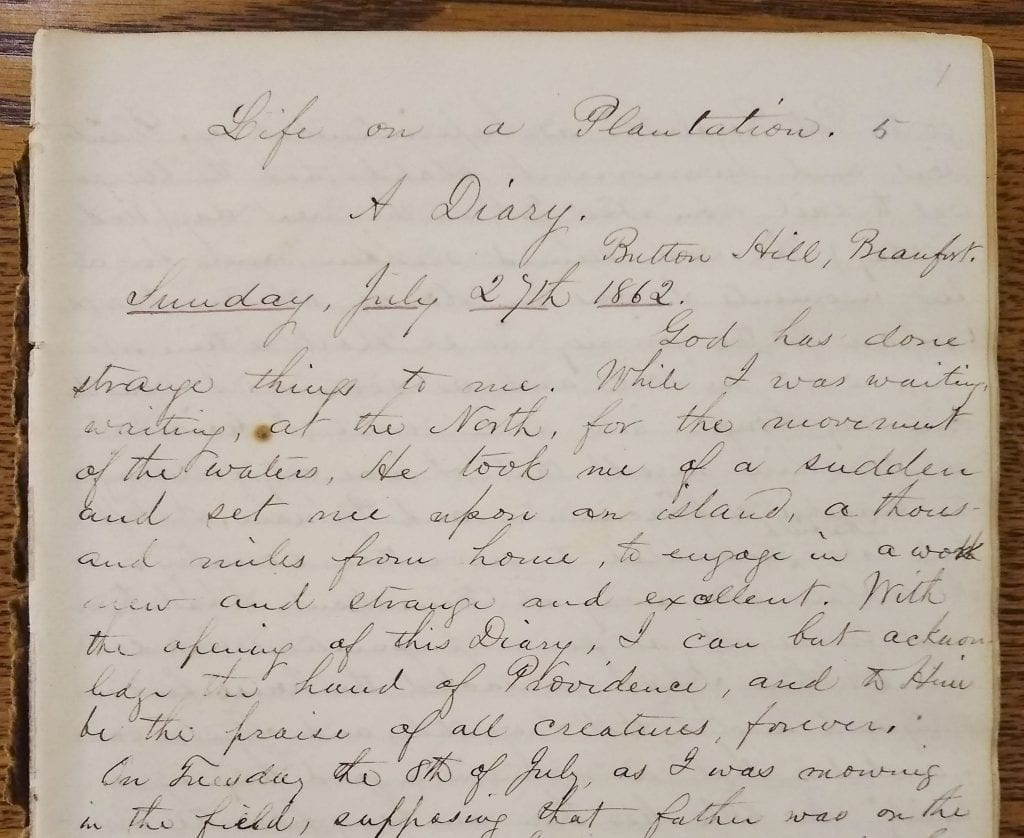
On July 8th, 1862, Ebenezer Porter Dyer Jr. (Amherst College Class of 1861) received an urgent letter from the Boston Educational Committee asking him to sail the next day from New York City “to go to Port Royal, S.C. as Superintendent of Plantations”. It turns out the letter Dyer received was wrong (once he arrived in New York, he found the ship wasn’t scheduled to set sail for several days) but Dyer still left his home in Massachusetts that night to embark on a year of living in South Carolina during the Civil War.
The year that Dyer spent in South Carolina is detailed in his diary, which I recently rediscovered along with some of Dyer’s short stories and journals while working with 19th century alumni materials. His diary gives a glimpse into his life from 1862-1863, while he worked as a Northern relief worker in the South during the Civil War. In the first entry, Dyer tells us about his frantic departure for New York, sailing to South Carolina through a Union blockade, arriving at the plantation and quartering Union soldiers there, and his observations of religious life on the plantation. But after his hectic arrival, things seem to calm down for Dyer, and his diary turns more towards social calls with other New Englanders living in the South, being constantly tormented by mosquitoes, and the boredom of being stuck inside because of heavy rain with no books to read.
As Superintendent of Plantations, Dyer mostly taught and preached, with some administrative duties, like payroll for freedmen who remained on the plantation. This was all part of the Boston Educational Commission’s mission as a relief organization to aid “persons released from slavery in the course of the war for the union”. The Boston Educational Commission would eventually expand its efforts and become the New England Freedman’s Aid Society, but at the time Dyer left for Port Royal the Boston Educational Committee primarily sent teachers and clothing to South Carolina.
It’s not clear from Dyer’s diary how or why he ended up teaching for the Boston Educational Committee. From the “First annual report of the educational commission for freedmen”, it seems like he probably applied and that there was a lot competition, but it’s also unclear why he was asked to leave in July (not February like the other teachers) and on such short notice. It would be interesting to know what made Dryer so passionate that he was happy to leave at a moment’s notice, or if the emphasis on service during his time at Amherst College influenced that at all. But either way, Dyer’s diary gives us an Amherst alum’s perspective on the South during the Civil war, and new information about what Amherst alumni were doing during that era.
The First annual report of the educational commission for freedmen used above is Collection Reference Number GLC06232.15 at The Gilder Lehrman Institute of American History. All copyright belongs to The Gilder Lehrman Institute of American History.
For more information on the Boston Educational Commission’s activities, check out the New England Freedman’s Aid Society Records (digitized) from the Massachusetts Historical Society.
